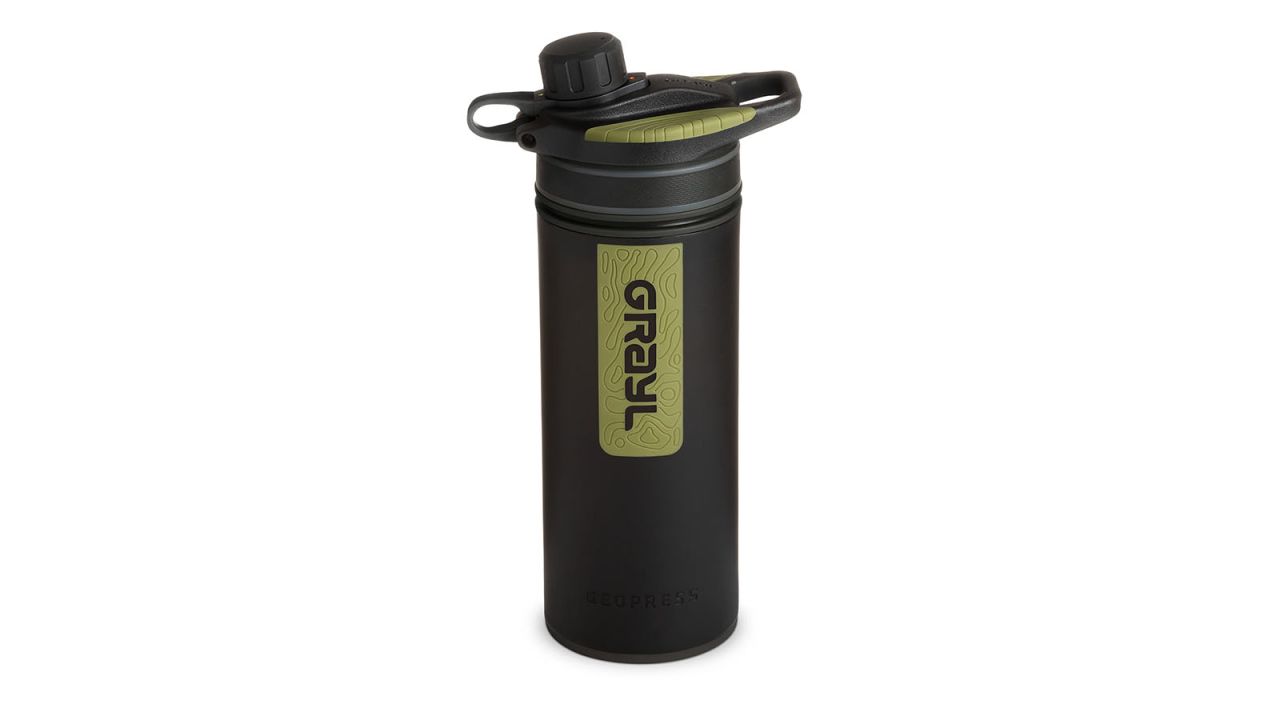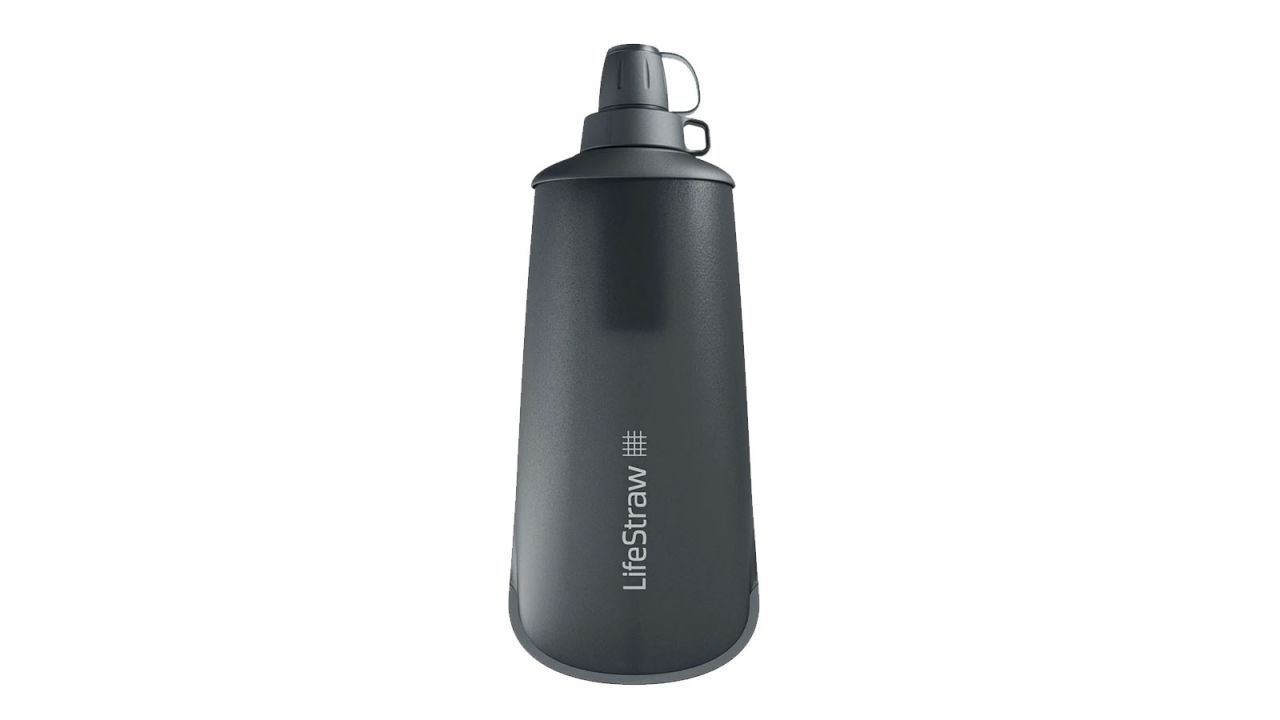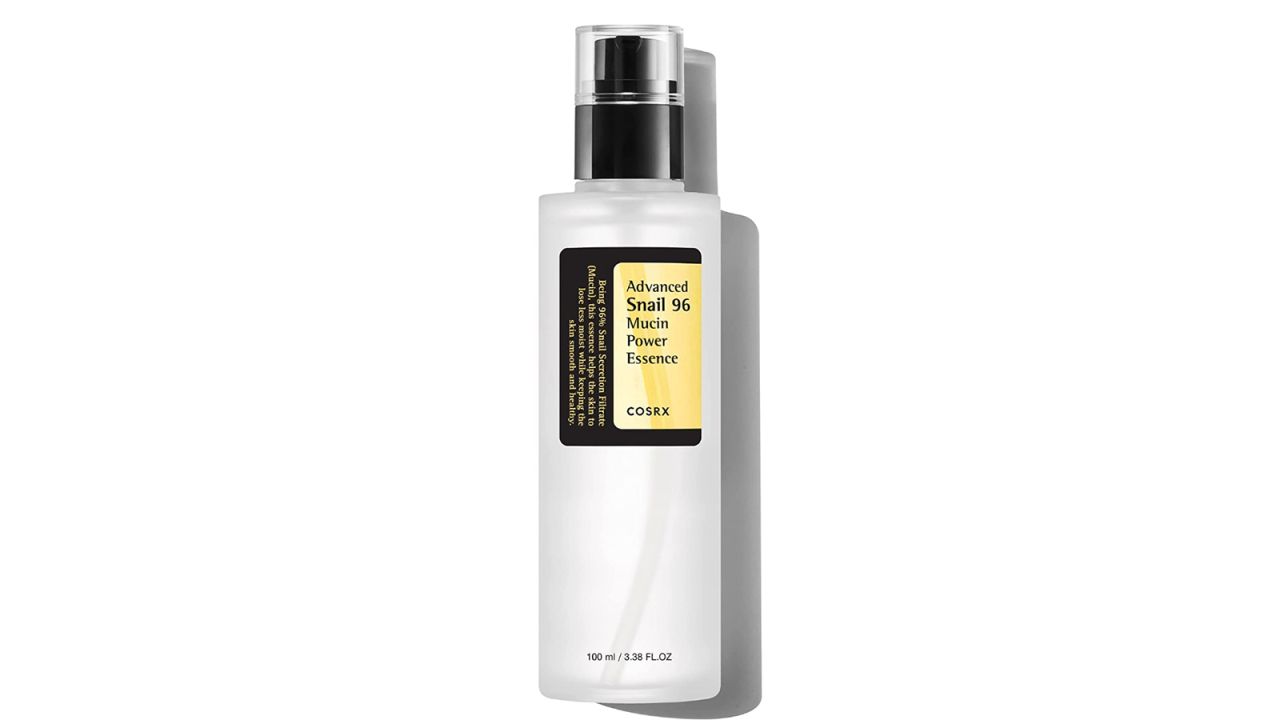The best filtered water bottles we tested:
Best filtered water bottle: Grayl 24-Ounce GeoPress
Best filtered water bottle for backpacking: LifeStraw Peak Series Collapsible Squeeze 1L Bottle
Best filtered water bottle for international travel: Waatr CrazyCap Pro
When you’re hot, sweaty and in the middle of a big adventure in the great outdoors, you want the best filtered water bottle you can get. Not only do these bottles help keep you safe, but the best filter water quickly and effectively, so you can spend more time hiking and enjoying nature.
Bottle-and-filter combos have become all the rage in recent years, combining the tech-savvy bacterial filtering capabilities of your favorite backcountry squeeze bag or UV wand with a durable drinking vessel for an all-in-one water bottle that promises maximum ease and portability.
We tested 15 of the top brands and models on the market today, putting each one through the wringer before a final few tests in the wilderness (including a five-day stint backpacking in Alaska’s interior mountains). The result? Two stand-out, self-filtering water bottles and one ultra-light pouch that are the ideal safe-drinking companions for hikers, trail runners, backpackers and intrepid international travelers.
Boasting an impressive filter that the brand has tested to safely eliminate viruses, heavy metals, cysts, harmful bacteria, pesticides and more from the gnarliest water, Grayl’s 24-Ounce GeoPress is a sturdy, go-anywhere water bottle that’s as at-home on an expedition in a developing country as it is on a backcountry camping trip.
Though it doesn’t filter out viruses like our overall-winning Grayl GeoPress, LifeStraw’s Collapsible Squeeze Bottle offered a featherlight 3.9-ounce weight, perfect for trail runners and overnight backpackers who want to save big on space and weight. Plus, LifeStraw says it filters out key bacteria and parasites commonly found in US waters, and it offers a fast-flowing, easy-drinking straw.
Utilizing a lightweight battery, USB charger and UV light treatment, Waatr’s CrazyCap Pro bottle seamlessly eliminates viruses and bacteria with the same sanitizing UV technology used to clean operating rooms, according to the brand. With the press of a button, a 60-second cycle turns uncertain tap water into clean-drinking bliss.
Best filtered water bottle overall: Grayl 24-Ounce GeoPress
$100 at REI, Grayl and Amazon
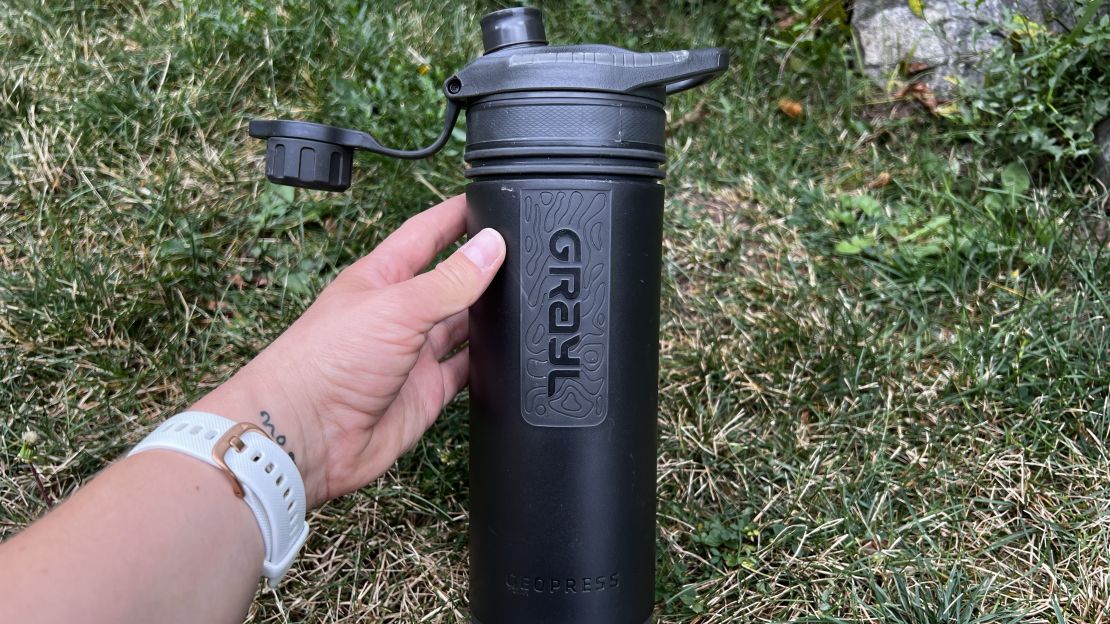
A filtered water bottle needs to be durable, reliable and lightning quick at its job, all while eliminating harmful bacteria and parasites from uncertain water sources. Thankfully, the unique design of Grayl’s GeoPress not only means that hikers and travelers can enjoy 24 fluid ounces of clean hydration after a mere eight seconds of work but, according to Grayl, it’s also robust enough to remove viruses from drinking sources, making it an excellent pick for international travel as well as outdoor pursuits. The only drawback? Its weight. The GeoPress, though sturdy and well-featured, was one of the heaviest bottles on our testing roster, coming in at 15.9 ounces, filter included.
By far, one of the most impressive things about Grayl’s GeoPress is the fact that the manufacturer says it can filter out viruses, which are much smaller than other pathogens, without the use of a UV-light disinfection system. This means that a user could stumble upon murky, stagnant water on a different continent and it would be able to safely remove both sediment and harmful critters from the source — a rare feat that would otherwise require UV or a specialized filter (and pre-filter). Plus, like many of the units we tested, the Grayl still filters out bacteria, parasites, heavy metals, pesticides and toxic chemicals.
To be clear, we weren’t able to test this claim or the filtering ability of any of the bottles we tested on our own, so we’re relying on information — both proprietary testing data and third-party testing and certifications — provided by the brands and manufacturers.
Grayl’s two models — the GeoPress and the UltraPress — feature a brand-specific “OnePress” design, which is essentially a bottom-facing filter and cup that lock into place when a user fills the lower unit with water and presses the filter and cup into it, creating up to 24 ounces of clean drinking water.

I personally hauled the Grayl GeoPress around on a backcountry camping trip near Crested Butte, Colorado, and found that it delivered great-tasting, clean water in a flash. Yes, I had to push down with some heft to press the water through the filter, but this single-press model was far less annoying to use than sucking hard through a straw filter and getting uncomfortable burps and air bubbles in the process (the things we do for gear testing).
On top of being a fantastic bottle for travel and hiking, the Grayl would also be an ideal solution for cold-weather wilderness wanderers wearing gloves or mittens, as this press’s functionality doesn’t require much dexterity. The bottle is made of hard-shell polypropylene plastic with a nonslip grip along the side and around the bottom, ensuring a secure hold while it’s being used by the sweatiest adventurers in the most rugged environments.

One place where the GeoPress lost points in our testing was filter life span. Given how much the filter technology is called upon to do, this isn’t a surprise, but it is something potential buyers should be aware of. The brand states that each GeoPress filter can last for 350 cycles (250 liters) or three years, whichever comes first. At that rate, an avid summer and fall hiker would likely need to purchase a replacement one each year, which costs $30. It’s not the end of the world, but it does make this setup one of the most expensive on our list. We also wished that the bottle came in a larger 1-liter size, as many of the other bottles we tested do. The Grayl is also on the pricier side of the filters we tested, but again, it does something none of the others can.
Bonus points go to both the GeoPress and the UltraPress for their optional add-on one-way drink mix valve, which makes it possible to throw your favorite electrolytes, like Nuun or Liquid I.V., into freshly filtered water without gumming up the delicate filter.
Bottom line: If you’re seeking a do-it-all water filtration bottle and don’t mind hauling a little extra weight for a top-notch product, Grayl’s GeoPress is a hard-working wonder for both hikers and global travelers. According to Grayl, it filters out bacteria, parasites, heavy metals, yucky chemicals and even viruses with a single, eight-second push, and it garnered bonus points for its array of fun and “covert” color options in our tests too.
Best filtered water bottle for backpacking: LifeStraw Peak Series Collapsible Squeeze 1-Liter Bottle
$44 at REI, LifeStraw and Amazon

Sometimes tacking on an extra pound of weight to your backcountry kit isn’t feasible or worth it, since you’re not trekking in a location ripe with viral contaminants. For day hikers, trail runners, backpackers and any adventure where weight and space are at a premium, we highly recommend the LifeStraw Peak Series Collapsible Squeeze Bottle in the 1-liter size. It’s fast flowing, lightweight and boasts an ample fill-up bag for taking your gulps with you wherever you go.
At first glance, this LifeStraw Squeeze bottle didn’t seem much different from other pouch filter systems we tried out, apart from its dark, dirt-hiding color, but it excelled against its competition in our grip and durability tests. The unit’s lower bag is made of textured thermoplastic polyurethane that was easy to grab with bare, wet hands and darn near impossible to rip apart at the seams (no matter how hard we huffed and puffed).
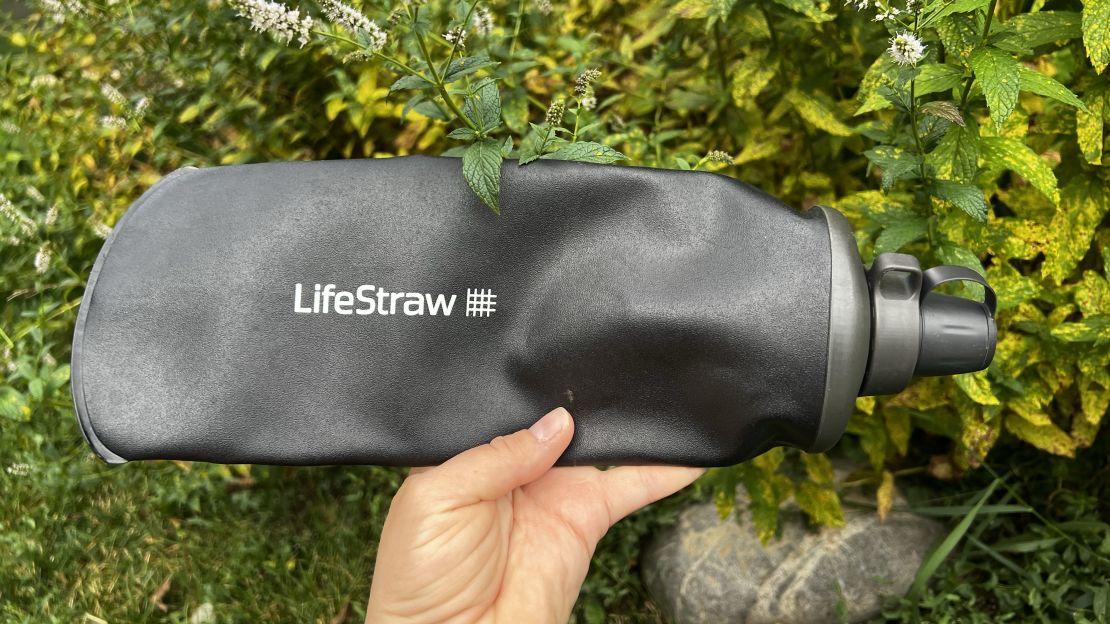
This squeeze-pouch design also beat its competition (the HydraPak Flux+ and the Katadyn BeFree) in both the speed and filter life span categories, squishing out a cup of water in an impressive 13 seconds. This fast-acting filter is rated to last for 2,000 liters, significantly better than our overall winner, the GeoPress, which can only filter 250 liters before needing a cartridge replacement. Plus, unlike the GeoPress, it can be backwashed with clean water (much like a Sawyer squeeze filter), which helps to extend its flow rate and life span.
On a hiking and van camping weekend outside of Aspen/Snowmass, I found that, even in a buggy, slow-moving stream, the LifeStraw Peak Series Collapsible Squeeze Bottle was easy to fill and, perhaps most importantly, blessedly easy to sip through. I toted it around with me on treks to Green Lake and deep into Gothic Valley and found its slim, lightweight profile far superior to the now defunct Sawyer squeeze pouches of my past. I was so impressed with its performance that I shoved it into my backpack on a rugged, five-day backpacking trip in Wrangell-St. Elias National Park and loved how it was able to filter out the gnarly glacial sediment with ease.
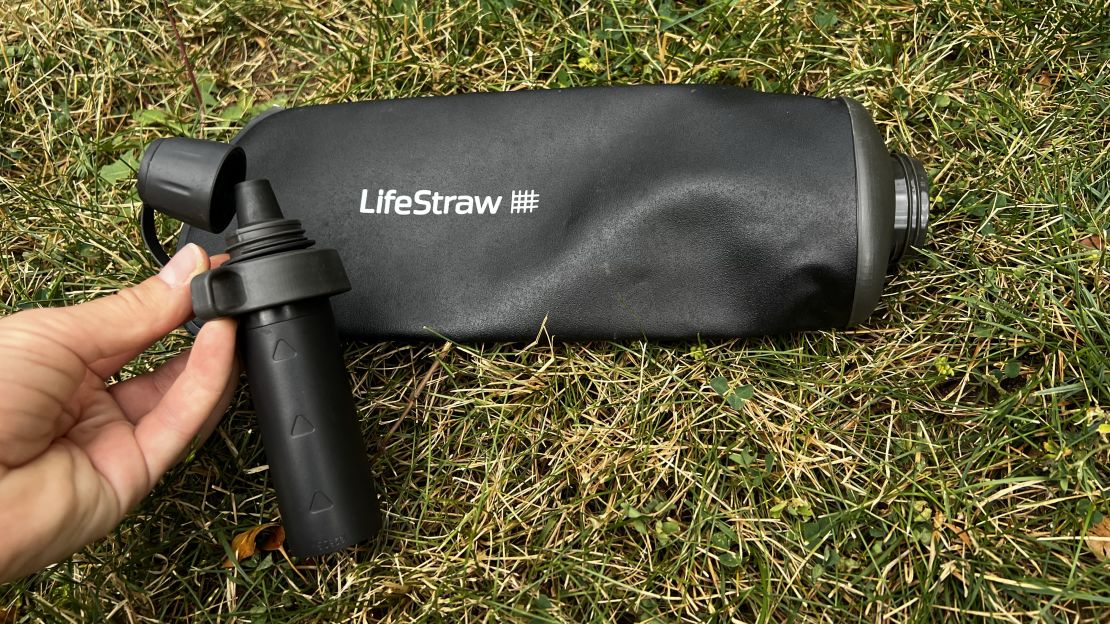
CNN Underscored’s outdoor editor, Kai Burkhardt, has tested the LifeStraw Peak Series in the past, and after a few months, he got a small puncture in the bottle, likely from squeezing too hard while filtering. During my testing, which included scraping and dropping it against a slew of Alaskan river rocks, I haven’t had any durability issues at all, but know this thing isn’t completely bombproof.
While it doesn’t filter out viruses and heavy metals like our overall winner, the GeoPress, LifeStraw’s Peak Series Collapsible Squeeze Bottle system is lightweight enough to take along on your gnarliest thru-hikes, while remaining robust enough to filter out nearly any contaminants lurking in US waters.
Best filtered water bottled for international travel: Waatr CrazyCap Pro
$49 at Amazon
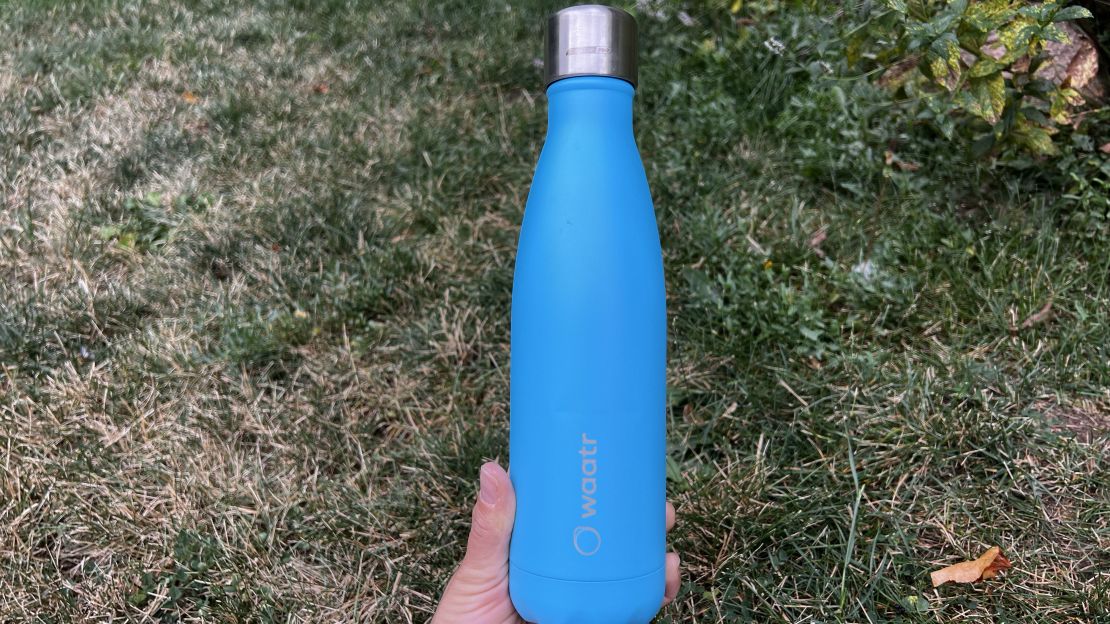
When you’re traveling afar (think India, Mexico or Africa) and need an easy-to-use, self-filtering water bottle that’ll put bacteria and viruses in their place (out of your water), Waatr’s CrazyCap Pro is a durable, colorful and incredibly easy-to-use solution for filtering mostly clear water straight out of a questionable tap. Just press a button to activate its UV-light disinfectant cycle for 60 or 180 seconds.
The downside to a self-filtering water bottle that uses a UV light for sanitizing your precious hydration? The water you put into it needs to be relatively clear and free of sediment for the filter to do its job properly. That means you can fill up at any tap around the world, but trying to drink from stagnant lakes or murky rivers might leave you with a mouth full of dirt. It also requires a USB charging cable to load up on battery juice approximately every seven days (assuming five uses per day). This is fine for someone day hiking or sleeping in a hotel or hostel at night but maybe not ideal for a long-distance thru-hike.

Weighing in at a middling 12.6 ounces (for the 17-ounce model we tested, battery included), the CrazyCap Pro’s design is reminiscent of Swell’s ultra-trendy, old-school soda-shaped water bottles. It comes in roughly a dozen colors, ranging from bright yellow Sunshine to mild-mannered Onyx, and resembled an ordinary, chic city water bottle more than all others on our list. Though we tested the 17-ounce model and it was a cinch to slide it into backpack pockets, purses and cup holders, we recommend sizing up to the 25-ounce unit to avoid constant fill-ups when you’re out exploring a new place.
Another sweet feature of the CrazyCap Pro was its well-crafted insulation that kept cold water chilled for nearly 24 hours, a wonderful treat if you’re wandering around the hot streets of Bangkok and want to preserve your cool H2O for a day-long outing. The bottle, which is made of durable stainless steel, is also the only non-plastic option among our three winners. (Grayl’s GeoPress does come in a pricier titanium model, which we did not test.)
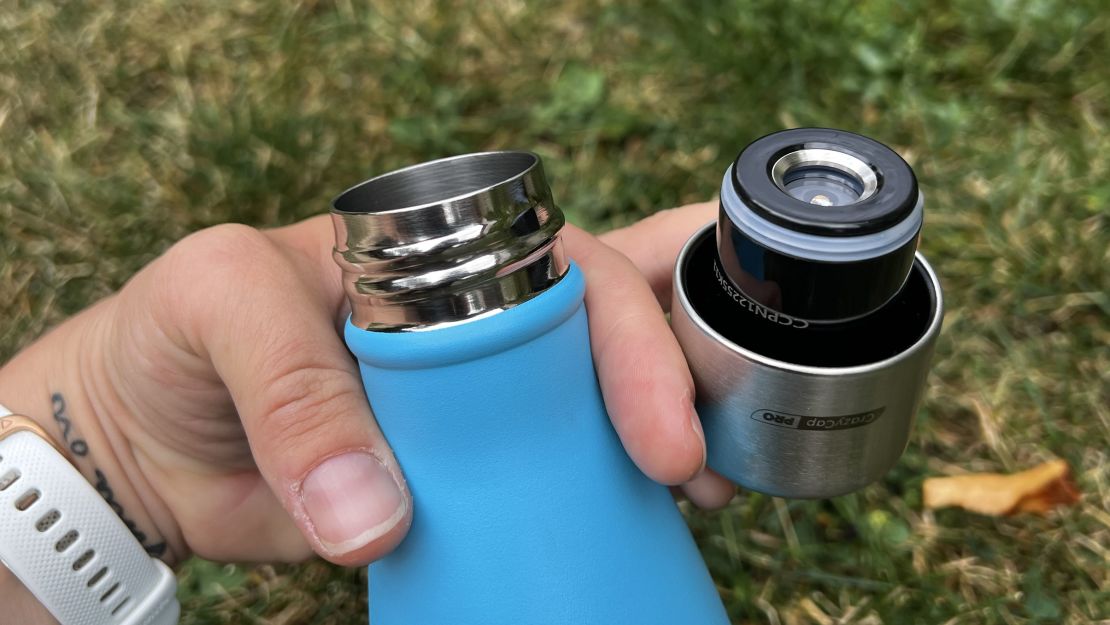
Unlike the Grayl GeoPress and LifeStraw’s Peak Series Collapsible Squeeze Bottle, the CrazyCap Pro utilizes the same UV technology used to sanitize operating rooms to kill off dangerous bacteria and viruses in your drinking water. It’s the only winner on our list that isn’t plastic (for all you stainless steel die-hards out there), and it is an ideal pick for international travelers who want to safely and easily filter their questionable tap water with a simple press of a button.
Everything you need to know about filtered water bottles
Though many hikers, bikers, backpackers and world travelers still rely on time-consuming water filtration pumps, handheld UV filters and annoying squeeze bags to create safe drinking water when they’re out in the wild, filtered water bottles and pouches have struck a chord in recent years, due to their all-in-one efficiency and ease of use. They eliminate the need to carry both a hard-sided container or water bladder and a separate pump or filter, instead combining the two into one standalone unit.
Water bottles with included, attached filters are designed to eliminate the most dangerous and bad-tasting contaminants that could possibly be in your water source. But not all filters are created equal. Most are intended to be used in wilderness settings, where bacteria like E. coli and salmonella and parasites like giardia are the key critical offenders that need to be removed before hydrating. In many developing countries, however, travelers will want to take their H2O sterilization a step further and splurge on a pricier, more intense filter that takes out viruses and heavy metals.
To save on weight and maximize durability, most self-filtering bottles are made with BPA-free plastic, which shouldn’t affect the taste of your freshly filtered water, even if you’re carrying it around on a sunny summer day. A few that we tested in our lineup were made with durable, insulating stainless steel, which was more likely to suffer minor dents when dropped onto a hard surface from 9 feet. Bottle weight on our list ranged from 7.5 ounces to 15.9 ounces, and lightweight pouches ranged from 2.2 ounces to 5 ounces.
Some bottles we tested, namely Brita’s Insulated Filtered Water Bottle and Hydros’ Water Filter Bottle, were only designed to filter out Class 1 particulates, a standard measured by the National Science Foundation (NSF). As such, they are really only fit to filter out “poor taste” caused by chlorine and sediment in otherwise-safe tap water that you’d find in most developed nations. We strongly recommend against using either of these bottles for hiking, international travel or wilderness expeditions, as they won’t filter out critical bacteria and parasites.
Ultimately, you want the bottle to fit the location you’ll be hauling it to. If you’re backpacking within the United States, a lightweight filtering pouch should be fine. If you have a reliable USB power source and want to eliminate?Hepatitis A from your tap water in a foreign country, go with a UV disinfectant device. If you need a design that’ll do both, go big, brave the extra weight and get yourself a Grayl.
How we tested
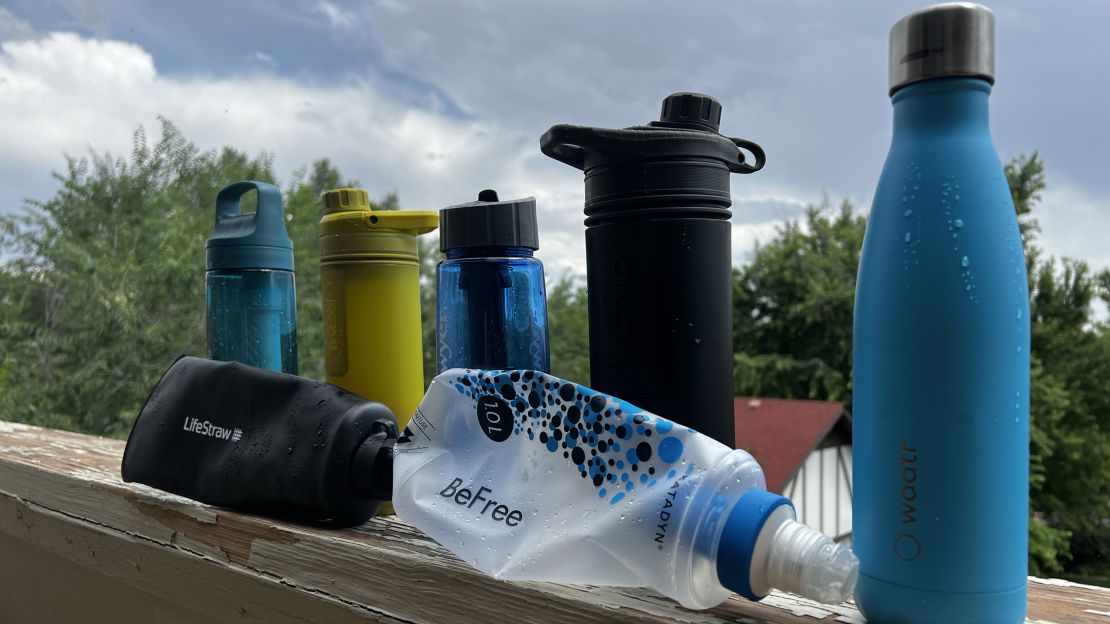
Our editorial team came up with a long, multi-question rubric to suss out the fastest, most durable, best filtered water bottles on the market today. Next, a 15-bottle cross-section of the top-selling models was assigned to a gear tester to put through the wringer. The three products that scored highest were then taken out into the field for wilderness testing in real-world scenarios like backcountry camping, filtering from stagnant puddles and pulling water from small creeks.
We did not test any of the bottles for their microscopic filtering capability and, instead, relied on information provided by the brands and manufacturers. However, after comparing what each brand said its product could filter out, we ran the bottles through various tests to measure filter speed, ease of cleaning and more.
Performance
- Filter performance: We paid special attention to what every filter was rated to eliminate from a water source, including heavy metals, cysts, bacteria, silt, parasites and viruses.
- Drinkability: We had our tester drink one cup of water as quickly as possible, using a stopwatch for time.
- Leak test: We tossed each bottle and pouch around, put it into a bag, and violently shook it around to be sure no liquid would leak out.
- Grip: Each bottle and pouch was tossed from one hand to the other to assess if it stayed grippy when wet and sweaty, and to assess the outer texture for maximum grip.
Durability
- Drop test: We dropped each bottle and pouch from a height of 9 feet onto a hard surface and examined chips, dents and damage.
- Ease of cleaning (bottle): Bottles and pouches were ranked based on if they were dishwasher-safe and easy to clean.
- Ease of cleaning (filter): Is the filter able to be backwashed, or does it need to get replaced? Bottles were ranked based on ease and cost of cleaning and replacement parts.
- General build quality: We compared these water bottles and pouches to one another and to other top, non-filtered brands on the market and ranked them based on the quality and sturdiness of the materials used in production.
Design
- Weight (empty): Every bottle and pouch was ranked from lightest to heaviest, based on the weight when empty in ounces.
- Size: We looked at how much water each vessel could hold and also its overall shape and circumference to ensure if each could fit into a standard backpack pocket or car cup holder.
- Color options: We counted the color options available for each model across a variety of different websites and ranked them, from most flamboyant and fun to most singular and drab.
Price
- Online cost: We looked at the average cost of each water bottle and filter pouch and compared it to other similar bottles on our list.
Other filtered water bottles we tested
Grayl UltraPress
$90 at Grayl
This water bottle was very similar to Grayl’s top prize-winning GeoPress, in that it can filter out viruses with a simple, 10-second press, but it scored lower marks for its smaller size (16.9 ounces), shorter filter life span and similar price point for a near-identical (but subpar) bottle. It boasts loads of fun color options, though, and a lighter weight and smaller size than the GeoPress, making it a good option for those who want to filter viruses for under $90 and have a slimmer, cup holder-friendly bottle.
Grayl UltraPress Ti Purifier
$200 at Grayl
This is truly the Cadillac of filtering water bottles, meaning that, if you’re willing to pay a bit extra, you’ll get a superior product, loaded with Grayl’s fantastic OnePress filtration system, which can remove even the smallest viruses in a mere eight seconds. While we loved that this bottle’s titanium outer shell could double as a camp pot to boil water over a fire or stove, the product’s 20-ounce weight (for the 24-ounce model) and $200 price tag ultimately eliminated it from our winner’s circle.
Sawyer Bottle Water Filtration System
$41 at REI
As one of the most robustly rated filters on our testing roster (this bad boy claims to filter up to 100,000 gallons or 400,000 liters), Sawyer’s Bottle Water Filtration System is similar to the best-selling Sawyer Mini Water Filter but with a hard-shell plastic bottle thrown on top. The straw function was much harder to drink through than others we tested (including the LifeStraw Squeeze), and the bottle was one of the very few that suffered damage on our drop test: Its hard upper plastic chipped twice.
LifeStraw Go Series 22-Ounce Water Bottle
$45 at LifeStraw
Like most of the filtering water bottles we tested, LifeStraw’s Go Series filters out harmful bacteria like E. coli and salmonella using a membrane microfilter, but the bottle also comes with a replaceable carbon filter for chlorine and odors. However, it only lasts for 100 liters. This is great if you’re traveling within the US or developed countries and want to filter out bacteria and bad taste, but we didn’t love that this meant an extra $5 maintenance cost every month or so. We prefer the lighter LifeStraw pouch for backcountry excursions since you can backwash it in the wild and the Grayl or CrazyCap for international travel, thanks to their virus-killing ability.
Brita Insulated Filtered Water Bottle
From $22 at Amazon
Brita’s Insulated Filtered Water Bottle bills itself as a way to save 1,800 single-use plastic water bottles per year, but upon closer inspection, the main things this model is designed to filter are chlorine and particulate matter, like silt. That means it’s not fit to clean up your potentially bacteria-ridden stream and lake water or keep you safe on far-flung vacations. It’s, well, more about improving your tap water’s taste, which is why it scored low on our rubric.
Sawyer S-1 Select Foam Water Filter
$60 $59 at Highwater Filters
Coming in an eye-catching teal color, Sawyer’s S-1 Select Water Filter is made of a grippy silicone outer bottle filled with a special foam that removes chemicals and pesticides by adsorption. A Micro Squeeze Filter on top removes pathogens like E. coli and giardia. We liked this bottle a lot, and it was far easier to drink from than Sawyer’s Bottle Water design (11 seconds for an 8-ounce draw versus 26 seconds), but we didn’t love that it only comes in a 20-ounce size and the foam inner has to be replaced rather than cleaned and reused.
HydraPak Flux+ 1.5 Liter
$55 at HydraPak
We loved this filter, but it was a bit more expensive than the other pouches, harder to suck water from and had a slightly shorter life span than the ultra-light backpacking winner, the LifeStraw Peak Series Collapsible Squeeze Bottle. The one place it excelled? Bag size. This baby comes in sizes up to 1.5 liters, which is good news if you’re trekking in an area where fill-ups are sparse.
Sawyer S-3 Select Foam Water Purifier
$90 at Taiga Works
The Sawyer S-3 is truly a remarkable piece of water-filtering technology, filtering out viruses, heavy metals, pathogens and pesticides with ease. But like the S-1, the entire bottle (which includes the foam filter) must be replaced. It only filters 400 liters, and the bottle holds a mere 20 ounces — far less than a liter. Add to that the fact that it’s hard to find in stores and you’ll see why it scored a bit lower in our tests.
Katadyn BeFree 1-Liter Water Filtration System
$45 $38 at Amazon
Impressively lightweight at 2.2 ounces, Katadyn’s BeFree Water Filtration System gave us a lot to smile about. We loved its easy-to-drink-from straw opening and quick filtering time (a scant 13 seconds to suck down a cup of water — one of the fastest on our list), but we were hoping for a more durable pouch material from such a trusted backcountry brand. That being said, it’s a fine option that’ll filter bacteria in mere seconds for folks like trail runners and day hikers who might be keen on sparing some durability to save weight.
Hydros 20-Ounce Water Filter Bottle
$20 at Hydros
We found this water bottle to be very similar to Brita’s Filtered Water Bottle, in that it’s primarily designed to filter out National Science Foundation (NSF) Standard 42 particulates, which sounds fancy but only includes larger molecules like chlorine and sediment. As such, this vessel should only be used to improve the taste of hard tap water in large cities, and each replaceable filter is only good for 151 liters.
Larq Bottle PureVis
From $99 at Larq
While we admired the aesthetics, excellent insulation and 17-ounce or 25-ounce size availability of Larq’s PureVis, we didn’t love that this bottle uses its UV light to filter out viruses and bacteria every two hours rather than after the simple push of a button. We felt that this would run out the battery on long travel days or backcountry outings so we ranked it lower than the excellent (and similar) CrazyCap bottle.
Water To Go Water Purifier Filter Bottle
$60 at Amazon
The Water To Go Water Purifier Filter Bottle is perfectly fine for a filtering water bottle, but when you compare its price point against others in its class (this plastic marvel does not filter viruses — only bacteria), it starts to seem overpriced.

